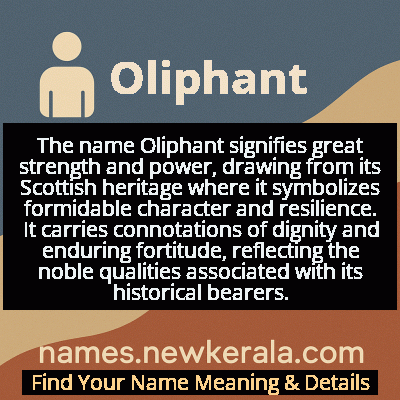Oliphant Name Meaning & Details
Origin, Popularity, Numerology Analysis & Name Meaning of Oliphant
Discover the origin, meaning, and cultural significance of the name OLIPHANT. Delve into its historical roots and explore the lasting impact it has had on communities and traditions.
Name
Oliphant
Gender
Male
Origin
Scottish
Lucky Number
5
Meaning of the Name - Oliphant
The name Oliphant signifies great strength and power, drawing from its Scottish heritage where it symbolizes formidable character and resilience. It carries connotations of dignity and enduring fortitude, reflecting the noble qualities associated with its historical bearers.
Oliphant - Complete Numerology Analysis
Your Numerology Number
Based on Pythagorean Numerology System
Ruling Planet
Mercury
Positive Nature
Adventurous, dynamic, curious, and social.
Negative Traits
Restless, impatient, inconsistent, prone to indulgence.
Lucky Colours
Green, white.
Lucky Days
Wednesday.
Lucky Stones
Emerald.
Harmony Numbers
1, 3, 9.
Best Suited Professions
Sales, marketing, travel, entertainment.
What People Like About You
Versatility, charisma, adventurous spirit.
Famous People Named Oliphant
Sir William Oliphant
Scottish knight and governor
Defended Stirling Castle during Wars of Scottish Independence
Laurence Oliphant
Author and diplomat
British MP and prolific travel writer
Caroline Oliphant, Lady Nairne
Songwriter and poet
Wrote classic Scottish songs including 'Will Ye No Come Back Again?'
Patrick Oliphant
Political cartoonist
Pulitzer Prize-winning editorial cartoonist
Name Variations & International Equivalents
Click on blue names to explore their detailed meanings. Gray names with will be available soon.
Cultural & Historical Significance
Throughout Scottish history, various branches of the Oliphant family held important positions in government, military, and cultural life, contributing significantly to Scotland's national identity. The name's association with elephants in heraldry also connected it to concepts of royal dignity and immense power in medieval symbolism. In the 19th century, literary figures like Caroline Oliphant (Lady Nairne) helped preserve Scottish cultural heritage through songwriting, ensuring the name remained relevant in artistic and cultural circles.
Extended Personality Analysis
Individuals bearing the name Oliphant are often perceived as possessing great inner strength and resilience, living up to the name's meaning of 'great strength.' They typically exhibit strong leadership qualities, determination, and a steadfast nature that allows them to overcome significant challenges. These individuals are often seen as pillars of stability in their communities, demonstrating loyalty to family and tradition while maintaining a dignified presence.
Their strength is not merely physical but extends to moral and emotional fortitude, making them reliable in times of crisis. Many Oliphants are known for their wisdom and patience, approaching problems with careful consideration rather than impulsive reactions. They tend to value heritage and history, often showing deep respect for traditions while still adapting to modern circumstances when necessary. The combination of Scottish cultural values with the symbolic weight of the elephant creates a personality profile marked by reliability, intelligence, and enduring strength of character.
Modern Usage & Popularity
In contemporary times, Oliphant remains primarily a surname rather than a given name, though it occasionally appears as a distinctive first name, particularly in Scottish families seeking to honor their heritage. The name maintains a strong presence in Scotland and among Scottish diaspora communities worldwide. While not common as a first name, its usage has seen occasional revivals among parents seeking unique, historically significant names with strong Scottish connections. In recent decades, the name has gained some recognition through popular culture, particularly with the massive creatures called Oliphants in Tolkien's Lord of the Rings, though this has had limited impact on its usage as a personal name. It remains most prominent in genealogical and historical contexts, with many modern Oliphants actively researching and preserving their family history through clan societies and genealogical research.
Symbolic & Spiritual Meanings
The name Oliphant carries rich symbolic meaning beyond its literal translation. The elephant symbolism represents not only physical strength but also wisdom, longevity, and loyalty—qualities highly valued in Scottish culture. In heraldic tradition, the elephant denotes great strength, wit, and longevity, while also symbolizing royalty and dignity. The name evokes images of steadfastness and reliability, much like the elephant's reputation as a creature that never forgets and remains loyal to its herd. Metaphorically, Oliphant suggests someone who carries great burdens with grace and stands firm against adversity. The combination of Scottish heritage with elephant symbolism creates a powerful image of enduring strength rooted in tradition and history, making it emblematic of both personal fortitude and cultural continuity across generations.

